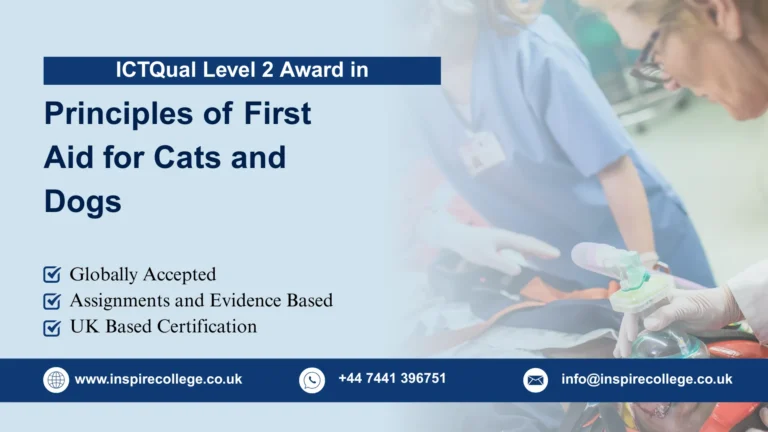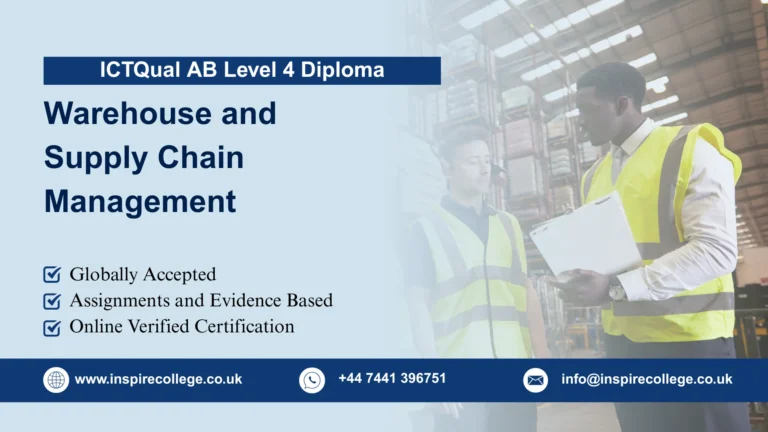
ICTQual AB Level 6 International Diploma in Industrial Safety & Risk Management
The ICTQual AB Level 6 International Diploma in Industrial Safety & Risk Management is a globally recognised programme designed for professionals and fresh learners seeking to excel in occupational safety, industrial risk mitigation, and regulatory compliance. This three-year, 360-credit qualification equips learners with the knowledge, practical skills, and strategic expertise required to lead safety initiatives across diverse industries worldwide.
With industries increasingly prioritising safety, sustainability, and risk management, this diploma prepares learners to effectively identify hazards, implement preventive measures, and develop comprehensive safety policies. The curriculum combines theoretical understanding with hands-on practical training, ensuring graduates can confidently manage risk assessments, emergency planning, and compliance audits in real-world industrial environments.
The programme is ideal for fresh graduates aiming to launch a career in industrial safety, as well as experienced professionals seeking advanced certifications to validate their expertise and enhance career progression. Learners will gain in-depth knowledge of occupational health standards, industrial risk frameworks, emergency response planning, and safety leadership, aligning with international standards and best practices.
By completing this internationally recognised programme, learners are prepared to drive safety excellence, reduce workplace risks, and contribute to sustainable industrial practices. Enrol with our ICTQual AB Approved Training Centre to access world-class learning materials and professional guidance for global career success in industrial safety and risk management.
To ensure learners are well-prepared for the rigours of this Level 6 international programme, the following entry requirements apply:
1. Age Requirement
- Learners must be 18 years or older at the time of enrolment.
2. Educational Background
- Completion of secondary education or equivalent (high school diploma, A-levels, or vocational qualifications) is required.
- A Level 5 qualification in occupational health and safety, engineering, industrial management, or a related field is preferred but not mandatory for fresh learners.
3. Professional Experience
- Route 1 – Experienced Professionals: Learners with at least 6 years of verifiable experience in industrial operations, safety management, or risk assessment can follow a fast-track pathway.
- Route 2 – Fresh Learners: Those without prior professional experience must complete the full three-year, 360-credit programme, including all assignments and practical assessments.
4. Language and Communication Skills
- Proficiency in English, both written and spoken, is required to understand course materials, complete assignments, and participate in assessments.
- Strong communication skills are beneficial for reporting, documentation, and collaborative projects.
5. Technical and Additional Requirements
- Basic computer literacy is required to access digital learning platforms, submit assignments, and utilise online resources.
- Commitment to health, safety, and ethical practices in all industrial and practical learning exercises.
6. Personal Attributes
- Strong analytical, problem-solving, and decision-making skills.
- Dedication to completing a three-year, industry-focused programme.
- Willingness to stay updated with emerging safety standards, risk management strategies, and industrial regulations.
Mandatory Units
This qualification, the ICTQual AB Level 6 International Diploma in Industrial Safety & Risk Management , consists of 36 mandatory units.
Year 1 – Foundation of Industrial Safety & Risk Management
- Principles of Industrial Safety Management
- Introduction to Risk Management in Industrial Environments
- Occupational Health and Industrial Hygiene Fundamentals
- Workplace Hazards Identification and Control Measures
- Safety Legislation and Regulatory Compliance
- Fire Safety and Emergency Preparedness
- Manual Handling and Ergonomic Safety
- Communication and Reporting in Safety Management
- Introduction to Environmental Safety and Sustainability
- Electrical and Mechanical Safety Awareness
- Incident Investigation and Root Cause Analysis
- Professional Ethics and Responsibility in Safety Practice
Year 2 – Applied Industrial Safety & Risk Management
- Advanced Risk Assessment and Hazard Control
- Safety Performance Monitoring and Auditing
- Process Safety Management and Hazardous Substances
- Industrial Safety in Manufacturing and Heavy Industries
- Safety Management in Construction and Energy Sectors
- Occupational Diseases and Preventive Measures
- Behavioural Safety and Human Factors
- Safety Culture Development and Change Management
- Safety Technology and Digital Tools
- Emergency Response Planning and Crisis Management
- Legal and Regulatory Frameworks (International Perspective)
- Research Methods and Data Analysis for Safety Management
Year 3 – Strategic Leadership in Industrial Safety & Risk Management
- Strategic Safety Leadership and Governance
- Integrated Management Systems (ISO 45001, ISO 14001, ISO 9001)
- Business Risk Management and Sustainability
- Advanced Occupational Health & Wellbeing Strategies
- Safety in Large-Scale Industrial Projects
- Corporate Social Responsibility and Ethical Safety Practices
- International Standards and Global Safety Frameworks
- Digital Transformation and Emerging Trends in Safety
- Policy Development and Implementation in Safety Management
- Research Project / Dissertation in Industrial Safety
- Professional Development and Lifelong Learning
- Capstone Project: Practical Application of Safety Leadership
Learning Outcomes for the ICTQual AB Level 6 International Diploma in Industrial Safety & Risk Management 360 Credits – Three Years:
Year 1 – Foundation of Industrial Safety & Risk Management
1. Principles of Industrial Safety Management
- Understand core concepts and principles of industrial safety management.
- Analyse safety risks and develop preventive strategies.
- Apply safety management principles to industrial operations.
- Evaluate organisational safety policies for effectiveness.
2. Introduction to Risk Management in Industrial Environments
- Identify potential hazards and assess risks in workplace settings.
- Develop risk mitigation and control plans.
- Understand the hierarchy of risk management strategies.
- Apply risk assessment tools to real-world scenarios.
3. Occupational Health and Industrial Hygiene Fundamentals
- Recognise occupational health hazards and their impacts.
- Apply industrial hygiene principles to maintain workplace health.
- Monitor and evaluate employee health and safety.
- Implement preventive health measures in industrial environments.
4. Workplace Hazards Identification and Control Measures
- Identify common workplace hazards across industries.
- Design and implement effective control measures.
- Use hazard assessment tools to minimise risks.
- Promote a proactive safety culture in industrial settings.
5. Safety Legislation and Regulatory Compliance
- Understand national and international safety legislation.
- Ensure workplace operations comply with legal requirements.
- Interpret regulatory frameworks and standards.
- Advise organisations on compliance strategies.
6. Fire Safety and Emergency Preparedness
- Understand fire hazards and prevention methods.
- Develop emergency response plans and procedures.
- Conduct fire risk assessments and drills.
- Train personnel on fire safety and emergency response.
7. Manual Handling and Ergonomic Safety
- Identify risks associated with manual handling tasks.
- Apply ergonomic principles to reduce injury risk.
- Implement safe handling and lifting techniques.
- Assess workplace ergonomics and recommend improvements.
8. Communication and Reporting in Safety Management
- Develop effective safety communication strategies.
- Document and report incidents accurately.
- Facilitate communication between management and employees.
- Use reporting tools to track safety performance.
9. Introduction to Environmental Safety and Sustainability
- Understand environmental risks in industrial operations.
- Apply sustainable practices to reduce environmental impact.
- Promote compliance with environmental regulations.
- Assess workplace activities for sustainability performance.
10. Electrical and Mechanical Safety Awareness
- Recognise hazards associated with electrical and mechanical systems.
- Apply safety procedures for equipment operation and maintenance.
- Conduct basic risk assessments for machinery and electrical systems.
- Promote safe working practices among personnel.
11. Incident Investigation and Root Cause Analysis
- Conduct systematic incident investigations.
- Identify root causes of accidents and near-misses.
- Recommend corrective and preventive actions.
- Apply investigation findings to improve safety systems.
12. Professional Ethics and Responsibility in Safety Practice
- Understand ethical principles in industrial safety.
- Promote accountability and responsibility in safety management.
- Apply ethical decision-making to workplace safety scenarios.
- Uphold professional standards and integrity in safety practice.
Year 2 – Applied Industrial Safety & Risk Management
13. Advanced Risk Assessment and Hazard Control
- Conduct comprehensive risk assessments using advanced methodologies.
- Implement hazard control strategies across complex operations.
- Evaluate effectiveness of risk control measures.
- Apply risk management frameworks to industrial projects.
14. Safety Performance Monitoring and Auditing
- Develop performance indicators for safety management.
- Conduct audits to assess compliance and effectiveness.
- Analyse safety data to identify trends and improvements.
- Report audit findings and recommend corrective actions.
15. Process Safety Management and Hazardous Substances
- Manage safety in processes involving hazardous substances.
- Apply process safety standards and procedures.
- Conduct hazard identification and control for industrial processes.
- Ensure compliance with chemical safety regulations.
16. Industrial Safety in Manufacturing and Heavy Industries
- Apply safety principles in manufacturing environments.
- Address risks specific to heavy industries.
- Implement safety protocols for machinery and equipment.
- Monitor and evaluate industrial safety programs.
17. Safety Management in Construction and Energy Sectors
- Identify and mitigate risks in construction and energy projects.
- Apply sector-specific safety standards and regulations.
- Develop project safety plans and emergency procedures.
- Promote safety culture among workers and contractors.
18. Occupational Diseases and Preventive Measures
- Recognise occupational disease risks.
- Implement preventive health and safety strategies.
- Monitor employee exposure to hazards.
- Evaluate health programmes for effectiveness.
19. Behavioural Safety and Human Factors
- Analyse human behaviour and its impact on safety.
- Apply behavioural safety strategies to reduce incidents.
- Promote safety awareness and training programs.
- Evaluate human factors in accident causation.
20. Safety Culture Development and Change Management
- Assess organisational safety culture.
- Implement strategies to improve safety culture.
- Lead change management initiatives for safety improvements.
- Engage stakeholders in fostering a proactive safety environment.
21. Safety Technology and Digital Tools
- Utilise digital tools for safety management and monitoring.
- Apply technology to enhance hazard identification and reporting.
- Analyse safety data using digital platforms.
- Evaluate emerging technologies for industrial safety.
22. Emergency Response Planning and Crisis Management
- Develop emergency response plans for industrial incidents.
- Conduct crisis simulations and drills.
- Coordinate multi-team responses during emergencies.
- Evaluate effectiveness of emergency procedures.
23. Legal and Regulatory Frameworks (International Perspective)
- Understand global safety regulations and standards.
- Apply international safety frameworks in operations.
- Compare legal compliance requirements across regions.
- Advise organisations on meeting international safety obligations.
24. Research Methods and Data Analysis for Safety Management
- Apply research methodologies to industrial safety topics.
- Collect, analyse, and interpret safety data.
- Use evidence-based approaches for decision-making.
- Prepare reports and recommendations based on research findings.
Year 3 – Strategic Leadership in Industrial Safety & Risk Management
25. Strategic Safety Leadership and Governance
- Lead safety initiatives at organisational and strategic levels.
- Develop governance frameworks for industrial safety.
- Evaluate leadership effectiveness in safety management.
- Promote accountability and responsibility across teams.
26. Integrated Management Systems (ISO 45001, ISO 14001, ISO 9001)
- Implement integrated management systems across operations.
- Align safety, environmental, and quality standards.
- Conduct audits and evaluations of management systems.
- Enhance organisational efficiency through integrated compliance.
27. Business Risk Management and Sustainability
- Analyse business risks and implement mitigation strategies.
- Integrate safety management into corporate sustainability plans.
- Assess the impact of industrial operations on organisational resilience.
- Apply sustainability principles in safety leadership.
28. Advanced Occupational Health & Wellbeing Strategies
- Develop health and wellbeing programmes for employees.
- Address ergonomic, psychological, and environmental health risks.
- Monitor and evaluate programme effectiveness.
- Promote employee engagement in occupational health initiatives.
29. Safety in Large-Scale Industrial Projects
- Plan and manage safety in complex projects.
- Apply risk management frameworks to large-scale operations.
- Ensure compliance with safety legislation and standards.
- Evaluate project safety performance and outcomes.
30. Corporate Social Responsibility and Ethical Safety Practices
- Integrate CSR into organisational safety strategies.
- Promote ethical practices in industrial operations.
- Advise organisations on socially responsible safety initiatives.
- Assess the impact of CSR programmes on stakeholders and communities.
31. International Standards and Global Safety Frameworks
- Apply international safety standards to industrial operations.
- Evaluate global frameworks for compliance and best practice.
- Adapt local operations to meet international safety requirements.
- Benchmark organisational safety practices against global standards.
32. Digital Transformation and Emerging Trends in Safety
- Leverage digital technologies to improve safety management.
- Evaluate emerging trends in industrial safety and risk mitigation.
- Implement digital tools for monitoring, reporting, and compliance.
- Promote innovation in safety practices.
33. Policy Development and Implementation in Safety Management
- Develop organisational safety policies aligned with legislation.
- Implement policies across teams and operations.
- Monitor policy effectiveness and update as required.
- Communicate policy objectives to stakeholders effectively.
34. Research Project / Dissertation in Industrial Safety
- Conduct independent research on a relevant safety topic.
- Apply research methodologies and data analysis techniques.
- Present findings in a structured, professional report.
- Provide actionable recommendations based on research outcomes.
35. Professional Development and Lifelong Learning
- Identify opportunities for continuous professional growth.
- Apply reflective practice to improve safety leadership.
- Engage in lifelong learning initiatives in industrial safety.
- Maintain professional competence in evolving industrial environments.
36. Capstone Project: Practical Application of Safety Leadership
- Plan and execute a comprehensive safety management project.
- Integrate theoretical knowledge with practical applications.
- Demonstrate leadership, strategic thinking, and decision-making.
- Present project outcomes to showcase applied safety expertise.
The programme is designed for a diverse range of learners, from newcomers to industrial safety to experienced professionals seeking career advancement. Ideal learners can be categorised as follows:
1. Fresh Graduates and Entry-Level Learners
- Individuals aged 18 years or older with a keen interest in industrial safety, risk management, and occupational health.
- Candidates who have completed secondary education, vocational training, or equivalent qualifications.
- Learners seeking a strong foundational understanding of safety principles, risk assessment, and workplace compliance.
- Those aiming to develop practical skills aligned with international industrial safety standards.
- Individuals aspiring to enter professional roles in manufacturing, construction, energy, or industrial operations.
2. Early Career Professionals
- Junior engineers, safety officers, or technicians with 1–5 years of experience in industrial, construction, or manufacturing environments.
- Professionals seeking to specialise in risk management, emergency response, and industrial safety leadership.
- Individuals aiming to enhance technical competencies and leadership skills for career growth in safety-critical roles.
- Learners committed to hands-on experience combined with theoretical knowledge to address real-world safety challenges.
3. Experienced Industrial Safety Professionals
- Safety managers, engineers, or supervisors with 6+ years of professional experience.
- Individuals looking to formalise their expertise with an internationally recognised Level 6 diploma.
- Professionals aiming to move into strategic leadership, consultancy, or governance roles within industrial safety.
- Those seeking to broaden their knowledge in international safety standards, integrated management systems, and corporate social responsibility.
- Learners focused on long-term career growth and global mobility in industrial safety and risk management.
4. Career Switchers and Industry Enthusiasts
- Individuals from related technical, engineering, or operational backgrounds seeking to transition into industrial safety and risk management.
- Learners passionate about workplace safety, environmental compliance, and emergency preparedness.
- Candidates motivated to combine theory with practical application to develop industry-ready safety expertise.
Key Attributes of Ideal Learners
- Commitment to completing a three-year, 360-credit programme.
- Strong analytical, problem-solving, and decision-making skills.
- Effective communication and teamwork abilities for collaborative projects and industrial environments.
- Willingness to stay updated with emerging safety standards, digital tools, and regulatory changes.
- Dedication to ethical practice, sustainability, and maintaining high safety standards.
As an ICTQual AB Approved Training Centre, we offer learners two flexible pathways to achieve the Level 6 International Diploma in Industrial Safety & Risk Management. All learners must register with our centre to enrol and access course materials.
Route 1 – Experienced Professionals
Designed for learners with at least 6 years of verifiable professional experience in industrial safety, risk management, or related sectors.
- Submit evidence of prior work, responsibilities, and achievements demonstrating competence in:
- Industrial safety leadership and governance
- Risk assessment and hazard control
- Emergency preparedness and crisis management
- Compliance with occupational health and safety legislation
- Our centre evaluates existing knowledge and skills against the diploma’s learning outcomes.
- Targeted guidance or additional training is provided if any gaps are identified.
- Successful verification results in diploma certification without completing all 36 assignments, enabling fast-tracked recognition of expertise.
Route 2 – Fresh Learners
Designed for learners without prior professional experience in industrial safety or risk management.
- Complete the full three-year, 360-credit programme, including all 36 assignments, practical assessments, and case studies.
- Assessments are structured to demonstrate both theoretical understanding and practical application of safety and risk management principles in real-world industrial scenarios.
- Upon successful completion, learners are awarded the ICTQual AB Level 6 International Diploma in Industrial Safety & Risk Management.
Benefits of Both Routes
- Globally recognised and industry-relevant qualification.
- Validation of professional experience or comprehensive expertise for career progression.
- Preparation for leadership roles, consultancy, and strategic positions in industrial safety, risk management, and occupational health sectors.
Register Now
FAQs for ICTQual AB Level 6 International Diploma in Industrial Safety & Risk Management






